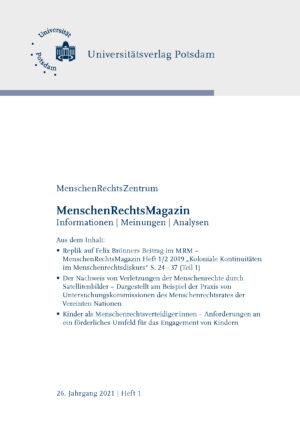With the development of unmanned ships, which are only monitored by personnel from control centers on land and otherwise operated by electric motors, solar energy and equipped with self-learning navigation programs, international shipping hopes that transport costs will be reduced by more than 20%. This advancing technical development will present international maritime law with challenges in the future. Against this background, the thesis primarily examines the compatibility of these ships with the United Nations Convention on the Law of the Sea. First the author develops a definition for the term ship and evaluates the application of the contract to autonomous ships. Then problem areas such as compliance with contractual obligations, the need for special protective rights for the flag states, especially with regard to coercive measures by the coastal states on board, and the applicability of the existing piracy regulations to these ships are discussed. The thesis also raises the question whether the international community, especially with regard to maritime environmental protection, has an obligation to promote unmanned ships under the United Nations Convention on the Law of the Sea. Finally, the necessary cyber security measures for this particular type of ship are evaluated. In conclusion, the analysis shows that the Convention on the Law of the Sea, with minor adjustments, can be applied to unmanned vessels.
ISBN: 978-3-86956-522-4
292 pages, Paperback
Release year 2022
Series: Acta Iuridica Universitatis Potsdamiensis , 8
15,00 €
Non-taxable transaction according to § 1 (1) UStG/VAT Act in combination with § 2 (3) UStG/VAT Act a. F. Providing this service, the University of Potsdam does not constitute a Betrieb gewerblicher Art/Commercial Institution according to § 1 (1) No. 6 or § 4 KStG/Corporate Tax Act. If the legal characterization of our business is changed to a commercial institution subsequently, we reserve the right to invoice VAT additionally. zzgl. Versandkosten
With the development of unmanned ships, which are only monitored by personnel from control centers on land and otherwise operated by electric motors, solar energy and equipped with self-learning navigation programs, international shipping hopes that transport costs will be reduced by more than 20%. This advancing technical development will present international maritime law with challenges in the future. Against this background, the thesis primarily examines the compatibility of these ships with the United Nations Convention on the Law of the Sea. First the author develops a definition for the term ship and evaluates the application of the contract to autonomous ships. Then problem areas such as compliance with contractual obligations, the need for special protective rights for the flag states, especially with regard to coercive measures by the coastal states on board, and the applicability of the existing piracy regulations to these ships are discussed. The thesis also raises the question whether the international community, especially with regard to maritime environmental protection, has an obligation to promote unmanned ships under the United Nations Convention on the Law of the Sea. Finally, the necessary cyber security measures for this particular type of ship are evaluated. In conclusion, the analysis shows that the Convention on the Law of the Sea, with minor adjustments, can be applied to unmanned vessels.
Recommended Books
-
 2019
2019Die Anfechtbarkeit und die Feststellbarkeit der Mutterschaft de lege lata und de lege ferenda
16,50 €Non-taxable transaction according to § 1 (1) UStG/VAT Act in combination with § 2 (3) UStG/VAT Act a. F. Providing this service, the University of Potsdam does not constitute a Betrieb gewerblicher Art/Commercial Institution according to § 1 (1) No. 6 or § 4 KStG/Corporate Tax Act. If the legal characterization of our business is changed to a commercial institution subsequently, we reserve the right to invoice VAT additionally.
zzgl. Versandkosten
Add to cart -
 2021
2021Die Konversion im Asylverfahren
12,00 €Non-taxable transaction according to § 1 (1) UStG/VAT Act in combination with § 2 (3) UStG/VAT Act a. F. Providing this service, the University of Potsdam does not constitute a Betrieb gewerblicher Art/Commercial Institution according to § 1 (1) No. 6 or § 4 KStG/Corporate Tax Act. If the legal characterization of our business is changed to a commercial institution subsequently, we reserve the right to invoice VAT additionally.
zzgl. Versandkosten
Add to cart -
 2015
2015Wolfgang S. Heinz, Klaus Hüfner, Jens Martens, Pascale Baeriswyl
Konzepte für die Reform der Vereinten Nationen
6,50 €Non-taxable transaction according to § 1 (1) UStG/VAT Act in combination with § 2 (3) UStG/VAT Act a. F. Providing this service, the University of Potsdam does not constitute a Betrieb gewerblicher Art/Commercial Institution according to § 1 (1) No. 6 or § 4 KStG/Corporate Tax Act. If the legal characterization of our business is changed to a commercial institution subsequently, we reserve the right to invoice VAT additionally.
zzgl. Versandkosten
Add to cart -
 2021
2021Theodor Schilling, Henning Goeke, Manuel Brunner, Leyla Davarnejad, Stephan Gerbig, Marlene Wagner, Andreas Zimmermann
MenschenRechtsMagazin ; 26 (2021) 1
11,50 €Non-taxable transaction according to § 1 (1) UStG/VAT Act in combination with § 2 (3) UStG/VAT Act a. F. Providing this service, the University of Potsdam does not constitute a Betrieb gewerblicher Art/Commercial Institution according to § 1 (1) No. 6 or § 4 KStG/Corporate Tax Act. If the legal characterization of our business is changed to a commercial institution subsequently, we reserve the right to invoice VAT additionally.
zzgl. Versandkosten
Add to cart
Publisher Info
Contact
Potsdam University Library
University Press
Am Neuen Palais 10
14476 Potsdam
Germany
verlag@uni-potsdam.de
0331 977-2094
0331 977-2292





